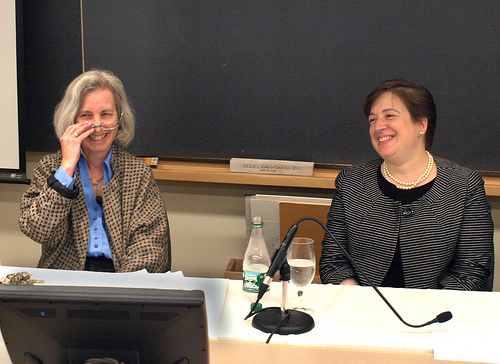Fordham Law School recently announced its decision to add a for-credit law firm marketing course to next spring’s curriculum. Although long overdue, this move will likely be viewed by both law schools and law firms as a milestone of sorts.
In his Law Marketing Blog post on the Fordham announcement, Larry Bodine put it this way:
We have all been:
- Waiting for the other shoe to drop
- Waiting for Hell to freeze over
- Waiting for a law school to teach marketing to students as a for-credit course.
The long wait is finally over. Fordham University School of Law in New York will begin offering a course on “Law Firm Marketing” that counts as 2 credits towards a law degree. Taught by academic pioneer Dr. Silvia Hodges, the elective course is designed to bring reality into the classroom starting in Spring 2011.
No marketing course is offered in any JD program at any other law school.
Color: In mid-April U.S. News & World Report released its 2010 Law School Rankings, showing Boston College, William & Mary, U.C.-Davis, Georgia, UNC and Wisconsin tied for 28th place and Fordham, Ohio State, University of Washington and Washington & Lee tied for 34th (the epic-tie approach prompted Elie Mystal, in Above the Law, to inquire: “Are we in Europe? Are we playing soccer?”)
The subject of professional development training –though too tame for the tabloids, is near and dear to my heart. I’m a Harvard College/Harvard Law graduate and practiced for 30 years in large firms, 24 as a partner. As a career deal lawyer I specialized in media and communications finance, representing institutional lenders and private equity funds. I recently retired to form my own company, providing business development and other practical skills advice, coaching and training to young lawyers and law students.
I have long believed that law firms should acknowledge, and aggressively address, the deterioration of the apprenticeship associate training model. For structural and cultural reasons, however, most of the major firms are not yet inclined to do so head on (some, in fact, feel the burden should be on the law schools themselves). (One stand-out exception: Sutherland Asbill & Brennan, following the appointment of Felice Wagner as Chief Business Development Officer. This firm is paying surprisingly close attention. It recently invested substantial lawyer time, effort and funds to design and implement a comprehensive business development training curriculum, for which Ms. Wagner and her firm deserve loud and vigorous applause.)
Meanwhile, most newly minted law school graduates enter the BigLaw workforce without adequate networking, communication and other practical business skills, much less serviceable business sense or drafting skills, and are billed out at prodigious rates poorly tolerated by their increasingly irritable clients.
In addition to fulfilling a core pedagogical obligation, business development and related skills training is an appealing and low-cost way to respond to pressures on tuition, enrollment and reputation borne of disappointing hiring results (the critical statistic underlying the US News rankings, of course, being “employed upon graduation”). Needless to say, the law school that launches graduates on a faster track to productivity (or cleverly manipulates the US News post-grad employment statistics) will distinguish itself from the competition.
One need only review the law school rankings to identify those schools whose sliding, or sluggish, reputations cry out for innovative curriculum change. It is not an accident that the first school to get out in front of the hitherto uninspired practical skills trend is ranked (with a flock of others) an unenviable 34th on the US News list.
It is essential, however, that the top-ranked law schools take the lead in expanding the curriculum to include marketing and business skills courses. Harvard could well make this happen in the near term, as a natural encore to the dramatic 1st year curriculum reforms adopted in 2006. Newly appointed Dean Martha Minow (below, left) (who captained the team that designed the curriculum changes), former Dean Elena Kagan (below, right), and Professor David Wilkins, who leads the HLS Program on the Legal Profession, are among those credited with breaking brand new pedagogical ground
Equally committed to core change, Northwestern Law School’s Dean David Van Zandt announced early this year an expansive program of curriculum and admissions reforms, including a two year JD program for select candidates. Enormous progress, in each case, by any measure.
A last point: Business development skills are most effectively taught in smaller classes (like the HLS problem solving workshops) and through individualized coaching. Large group presentations, with or without the ubiquitous power point, are inadequate to the task of engaging and instructing law students with widely varied communication styles and so-called “emotional intelligence”.
The bonus prize: The “real world” skills obtained or enhanced in hands on training will prove equally useful in any job search.
You may also like:
- Your Good Reputation: Common Courtesy
Business development is about relationships, first and foremost. What goes around comes around. Treat people right or pay the consequences in missed opportunities, broken relationships, burned bridges, and bad word of mouth….
- “Way Too Busy” to Build a Career? (Making Time for…
I can think of a million reasons why I don’t have the time to write this article. Pressing reasons. I’m “flat out”. Last week was “crazy” and it’s all I can do to catch up. I need some sleep. Did I already say that I’m “flat out”? I also have “a f…
- Best Practices for Summer Associates: In Three Simple Charts
A confession: I really really love charts. They help me think clearly. They entertain me. They keep things organized. So this year I offer all you summer associates my customarily blunt “best practices” advice in chart form. Three charts to be exact. Enjoy! And pass them on to the chart-less souls among your friends and family.
- What Do Blogging and Vegas Have in Common?? ….Building a…
It’s not as easy as it was for me–but much remains the same: Industry and skills specialization is still the fastest and smartest route to practice growth. Client contact, on the client’s turf, is still critical. Developing a reputation within your target industry or practice area still requires vastly more than a thorough understanding of the laws and regulations that affect it.



